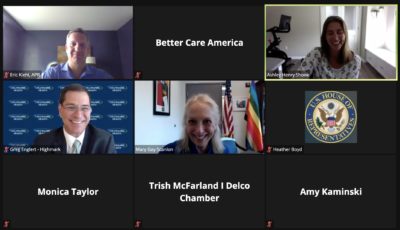Rep. Scanlon kicked off her remarks by applauding the group’s combined efforts to get more Pennsylvanians vaccinated. Rep. Scanlon also noted the work being done in Congress on the infrastructure bill to ensure aspects of human infrastructure – such as efforts to reign in pollution impacting communities – are adequately funded to help keep the broader population healthy. She also praised the role of telehealth throughout the pandemic in keeping Americans safe while providing essential treatment.
Greg Englert, Highmark’s Director of Federal Affairs, detailed Highmark’s ongoing efforts to get more Pennsylvanians vaccinated against COVID-19, highlighting the company’s participation in the Vaccine Community Connectors initiative, a project led by AHIP and other partners, which is working to deliver vaccines to elderly members of our most vulnerable populations. Highmark also activated mobile vaccine units to ensure that vulnerable populations were included in the plan’s outreach and delivery.
Dr. Monica Taylor, Vice Chair of the Delaware County Council, shared her experience responding to the COVID-19 pandemic in a county with no centralized health department. She stressed that making key partnerships with businesses, health care providers, and neighboring counties early in the pandemic response contributed to effective mobilization that likely saved Pennsylvanians’ lives. Dr. Taylor applauded the work of hundreds of volunteers who donated their time and efforts to staff vaccine clinics across Delaware County, getting shots in the arms of over 380,000 residents. She said, “The COVID-19 pandemic has tested our community in unprecedented ways… Thanks to the work of our residents, we are coming out of the pandemic stronger and more resilient.”
Eric Keel, Director of the Pennsylvania Association of Community Health Centers, discussed the important role that Federally Qualified Health Centers (FQHCs) play in health management for underserved populations across the state. On the COVID-19 vaccine, Keel said, “We’re focused on health equity, on the groups that might not be able to travel to larger clinics. We’re working hard to get into those communities that have health equity issues and face problems associated with the social determinants of health to get them educated about what the vaccine means for them and their families’ health.” He stressed the need to build trust with diverse communities to effectively spread the message about the effectiveness of the vaccine.
Chris McFarland, President of the Delaware County Chamber of Commerce, shared how small business have taken an active role in promoting community health and wellness in response to the pandemic. McFarland also applauded the emergence of telehealth as a success of the collective pandemic response.
Dr. Bob Wanovich, Highmark’s Vice President of Ancillary Provider Strategy and Management, closed the conversation with a deep dive on telehealth. Dr. Wanovich noted that, despite its success throughout the pandemic, significant work needs to be done to make telehealth more successful and sustainable. That includes the need for providers and payors to come together to define what can and cannot be done virtually following regulations that were eased amidst the pandemic. He also shared that insurers like Highmark are thinking creatively about the future of telehealth and the framework used to pay for these services. “The use patterns of telehealth during COVID-19 were telling for us. They told us what patients want and what clinicians think is important. Those factors will lead to changes in the way we cover and pay for virtual services.”
